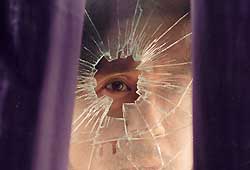|
||||||||||||||||||
| id.,
South Korea, 2003 directed by Chan-wook Park, starring Min-sik Choi, Ji-tae Yu, Hye-jeong Kang, Dae-han Ji Is it possible to review a film without revealing important elements of its plot and in particular its finale, when analyzing a film with many coup de théâtre? The multifaceted and ultra-violent Oldboy comes out from the more and more prolific breeding ground of South Korean cinema and belongs to the above mentioned category. It is full of narrative twistings and it does find a meaning, insomuch that it is really impossible not to talk about it. It faces very complex psychological themes such as heterosexual and incestuous love in the forest of human relations, the relation with others in the coming and going of the events of life, time and space as ontological restrictions that limit our sensorial experiences, revenge as continual search for the ultimate meaning of our past, the power of imagination as artificial tumult of damnation or salvation. It uses a visual framework tastefully crafted and reutilizes the story of an old manga with melodramatic and psychoanalytical features. The film always runs the risk of spinning into its own subject, into the concatenation of events; it is often unable to unfold in time and to reach the audience successfully. From the wonderful opening credits - digital ciphers and superimposed calendars on a dolly that does not show what is happening in images - begins Dae So's fantastic and passionate adventure. Prisoner in a bedroom for 15 years, he is ignorant of his jailer and the reasons of this dirty trick of him. Once he is out of this excruciating captivity, it won't take him long to find his torturer, since he himself comes forward and reverses the terms of their relation, being no longer the chased but the chaser, tailing Dae So that tries to discover a more and more twisted truth. His imagination is violated by hypnoses and his latent agoraphobia is perpetuated outside the four walls of his prison, a claustrophobic sense of not being able to be part of the swarming crowd. Dae So's life appears lost, misdirected and destined to damnation long before the opening credits, when he is drunk and raises hell in a police station. To this destiny he is forced by his unpleasant and excessive behavior and his inappropriate logorrhea. His destiny finds a terrible ideal situation and manifests itself in the room of his captivity. His fury, his determination, the effort of his imagination help him in real life or, at least, in wiping out hordes of opponents and in slaughtering them with a hammer - in the most exclusive and fascinating scene of the film, in a single slow crab shot, Dae So slaughters with highly likely gesture about thirty opponents. Outside he still lives as an outcast, only through the mad and wicked scheme of a sorrowful multimillionaire and resentful man, able to devote his whole life to seek his personal revenge, he can find a woman under hypnosis, one that loves him for real and is returned. Will I be able to kill my torturer before I discover how much grief have I provoked to him in the past to rouse such rage? And when I discover my blame, my fault, when I am obliged to accept the merciless vengeance, how can I still be active and press my attack? How can I seek revenge when I am blackmailed with the same destiny, in a chilling interplay of mirrors that lets me understand the inevitable misfortune that only my stupidity has produced and my teenage superficiality has allowed me to forget (a fantastic and highly credible dramatic stratagem in a work that makes of defiance of likelihood the well-aimed big number)? And if the inevitable compromise to survive and bear everything, my life and my alienation, means to accept a destiny and forget the truth, consciously repeating an oblivion similar to the one that has provoked all this, then, all things considered, it is inevitable that I accept with a wonderful smile on my face, my and her future, conscious that only with this hypocrite and obscene stratagem I will have one future, otherwise diverted for ever by my own errors. The terribly chilling and sublime cynism with which "Old Boy" Dae So accepts to cancel the discovery on which his sadistic tormentor has forced him, ends an excited and hyper-realistic story at the limits of tolerability. Among terrible scenes of violence (in details we see teeth pulled out with a hammer, sawed hands and tongues cut with a scissors) and an upsetting and breathtaking succession of coup de théâtre, the film gets to its unexpected and wonderful, snow-capped finale. And let incest be: any compromise is permitted after such clear understanding of one's dramatic mistakes, life changes its sense, everything is distorted forever. And even if it is exaggerated, overstated and fanciful, Oldboy is able to raise great emotions in any case. It tells a highly significant story, it keenly describes the abyss that waits us after each action, always and in any case, even in our real and likely earthly life. |
||||||||||||||||||

